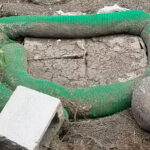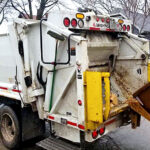Top: Composting facilities in Virginia include Royal Oak Farm in Evington. Photo courtesy of Coker Composting & Consulting
The Virginia Department of Environmental Quality (DEQ) released its annual report on solid waste management in Virginia, which provides the amount of solid waste managed in 2020, as well as the types and sources of solid waste generated outside the Commonwealth. Solid waste includes municipal solid waste (MSW), construction and demolition debris, industrial waste, vegetative and yard trimmings, and other types of garbage. During 2020, Virginia facilities received a total of 22.5 million tons of solid waste, a slight decrease of approximately 24,800 tons from 2019. MSW comprised 14.3 million tons of that total. Of the total MSW received, 10.3 million tons originated in the Commonwealth and 4.1 million tons originated from out-of-state jurisdictions.
Approximately 72% of solid waste is sent to landfills, 12% is incinerated, and 7% is recycled. “The annual report about the origin and type of wastes handled by Virginia’s facilities is an important tool for comprehensive management of solid wastes,” explains DEQ Director David Paylor. “We compile the report to help authorities plan for the future and to set statewide goals such as Governor Ralph Northam’s bold executive order to reduce plastic pollution and waste.”
Other findings of the report include:
- Approximately 3% of the waste was disposed by mulching or composting.
- Five states accounted for 97% of all waste received from out-of-state sources: Maryland, New York, New Jersey, Washington, D.C. and North Carolina.
- Solid wastes received at construction and demolition debris landfills increased by 13% and by nearly 1.3% at industrial landfills.













